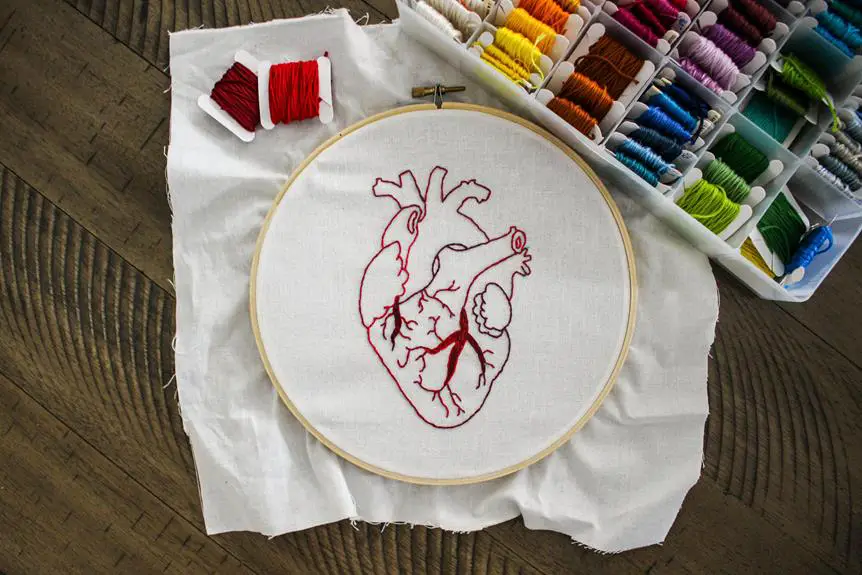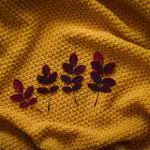When it comes to sewing, you need a thread that can hold everything together like a sturdy anchor. Understanding which fabrics work best with the strongest sewing thread is essential for mastering your craft.
From the durability of denim to the resilience of leather, different fabrics require different threads to ensure your stitches hold up over time. By exploring the characteristics of fabrics such as cotton, canvas, upholstery, nylon, and polyester, you can choose the right sewing thread to conquer any sewing project.
Understanding which fabrics pair best with the strongest sewing thread will elevate your sewing skills and ensure that your creations stand the test of time.
Key Takeaways
- Cotton fabric requires a high-quality, durable thread that matches its weight and characteristics.
- Denim fabric requires a heavy-duty thread such as polyester or cotton-wrapped polyester, with a heavier thread weight.
- Leather fabric needs a strong, durable thread specifically designed for leatherwork, along with a larger needle size and proper stitching techniques.
- Canvas fabric requires a high tensile strength thread such as polyester or nylon, taking into account the weaving density and additional coatings or treatments.
Cotton
When selecting sewing thread for cotton fabrics, choose a high-quality, durable thread that matches the weight and characteristics of the fabric. Cotton thread strength is crucial for ensuring the durability of your cotton fabric projects. Since cotton is a sturdy and versatile fabric, it's essential to match its durability with a thread that can withstand its characteristics. Using a thread that's too weak can result in breakage and fraying, jeopardizing the longevity of your cotton creations.
To ensure the strength of the cotton thread, look for options labeled as 'heavy-duty' or specifically designed for cotton fabrics. These threads are often made with long-staple fibers, which enhance their strength and reduce the likelihood of snapping or breaking during sewing. Additionally, consider the weight of the fabric when choosing a thread. Heavier cotton fabrics may require a thicker, stronger thread to adequately support the material and contribute to the overall durability of the finished piece.
Denim
When sewing denim fabrics, you'll want to choose a thread with exceptional strength and durability to match the sturdy characteristics of the material. Denim thread strength is crucial to ensure that your stitches can withstand the heavy-duty nature of denim. Here are a few key considerations for denim sewing techniques:
- Thread Material: Opt for a high-quality, heavy-duty thread such as polyester or cotton-wrapped polyester. These materials offer superior strength and resilience, making them ideal for denim sewing projects.
- Thread Weight: Select a heavier thread weight, such as size 40 or 50, to ensure that it can withstand the dense weave of denim fabric. A thicker thread will provide greater durability and prevent breakage during sewing.
- Needle Choice: Pair your strong thread with a sturdy needle designed specifically for denim or heavyweight fabrics. A sharp, durable needle will penetrate the denim fibers more easily, resulting in strong, secure stitches.
Leather
When sewing with leather, it's crucial to consider the strength of the thread and the durability of the stitching.
Leather is a tough material that requires a sturdy thread to ensure long-lasting seams and connections.
Understanding the specific thread strength needed for sewing leather will help you achieve high-quality and durable leather creations.
Leather Thread Strength
Strengthening leather thread involves carefully selecting the appropriate thread weight and needle size for your project. When working with leather, it's important to consider the following:
- Thread Types: Choose a strong, durable thread specifically designed for leatherwork, such as bonded nylon or polyester thread. These threads have the tensile strength needed to withstand the demands of leather projects.
- Needle Size: Opt for a needle that's suitable for leather sewing. A larger needle size will accommodate the thickness of the leather and prevent the thread from breaking or fraying during stitching.
- Stitching Techniques: Utilize proper stitching techniques like saddle stitching, which involves using two needles to create a strong, interlocking stitch. This technique enhances the overall strength and durability of the leather stitching.
Sewing Leather Durability
To achieve optimal durability when sewing leather, select a strong and durable thread specifically designed for leatherwork, such as bonded nylon or polyester thread. These threads are known for their strength, resistance to abrasion, and ability to withstand the demands of sewing thick and heavy materials like leather. When sewing leather, it's important to use the right techniques to ensure durability. Consider using a leather needle, which has a chisel point and is designed to penetrate leather without tearing the material. The proper sewing technique involves using a longer stitch length and sewing slowly to prevent the leather from bunching up or distorting. Here's a table comparing bonded nylon and polyester thread for sewing leather:
| Thread Type | Strength |
|---|---|
| Bonded Nylon | High |
| Polyester | Very High |
Canvas
When sewing on canvas, it's important to consider the strength of the thread you're using. Canvas can be a tough fabric to sew through, so you'll want to ensure that your thread is up to the task.
In the upcoming discussion, we'll explore the thread strength needed for sewing on canvas and the best types of thread to use for this durable material.
Canvas Thread Strength
Canvas thread strength depends on several factors, including the type of thread and the weaving density of the fabric. When evaluating canvas strength and thread durability, keep in mind the following:
- Thread Type: The type of thread used greatly impacts the overall strength of the canvas. For instance, polyester and nylon threads are known for their high tensile strength, making them ideal for heavy-duty canvas applications.
- Weaving Density: The tightness of the weave significantly influences the strength of the canvas. A denser weave provides better support for the thread, resulting in increased overall durability.
- Coating or Treatment: Some canvases come with additional coatings or treatments that enhance thread strength and durability, such as water-resistant coatings or UV-resistant treatments.
Understanding these factors will help you select the most suitable canvas and thread combination for your specific sewing project.
Sewing on Canvas
Regularly, you'll find that sewing on canvas requires a strong, durable thread to ensure long-lasting results. Canvas is a heavy-duty fabric commonly used for making bags, outdoor gear, and upholstery. When sewing on canvas, consider using a heavy-duty thread such as polyester or nylon for added strength. These threads are designed to withstand the tough and rugged nature of canvas fabric.
When employing sewing techniques on canvas, be sure to use a longer stitch length to prevent the fabric from bunching up. Additionally, consider using a denim needle, which is strong enough to penetrate multiple layers of canvas without breaking.
Proper canvas care is essential to maintain the integrity of your sewing projects, so always follow manufacturer guidelines for cleaning and maintenance.
Thread for Canvas
To sew on canvas, you need a strong thread that can withstand the fabric's heavy-duty nature. When choosing a thread for canvas, consider the following:
- Heavy-Duty Thread: Opt for thread specifically designed for heavy-duty sewing. Look for threads labeled as suitable for canvas, upholstery, or outdoor fabrics. These threads are often made of durable materials like polyester or nylon, providing the strength needed for sewing on canvas.
- Waxed Thread: Waxed thread is an excellent choice for sewing on canvas as the wax coating adds extra strength and water resistance. This type of thread is commonly used for leatherworking, making it a great option for heavy-duty canvas projects.
- Denim Thread: While primarily used for denim, denim thread's strength and thickness make it suitable for sewing on canvas as well. This thread type is designed to withstand the stress of heavy fabrics, making it a reliable choice for canvas projects.
Upholstery
Selecting the right sewing thread for upholstery requires considering the fabric's weight, texture, and intended use. Upholstery fabrics vary widely, from heavy-duty options like vinyl and leather to delicate materials such as silk and linen. When choosing a sewing thread for upholstery, it's crucial to match the thread's strength with the fabric's weight and durability requirements.
For heavy upholstery fabric, like leather or canvas, a strong polyester or nylon thread is essential to withstand the stress of everyday use. These threads are designed to endure the tension and weight placed on upholstery seams.
On the other hand, for lighter upholstery fabrics such as silk or satin, a finer but still durable thread is required to ensure the stitches don't overpower the delicate fabric. Additionally, different stitching techniques, like topstitching or double stitching, may be needed for specific upholstery fabrics to ensure the seams are secure and visually appealing.
Understanding the characteristics of both the upholstery fabric and the suitable stitching techniques is crucial for achieving durable and aesthetically pleasing upholstery.
Nylon
When sewing upholstery, you should consider using nylon thread for its strength and durability, especially with heavy-duty fabrics like vinyl and leather. Nylon thread is an excellent choice due to its ability to withstand stress and tension, making it ideal for upholstery projects that require long-lasting durability. Here are some important factors to consider when choosing nylon thread for your upholstery work:
- Nylon thread options:
- Look for bonded nylon thread, as it's specifically designed to handle the demands of upholstery work, offering superior strength and resistance to abrasion.
- Consider using nylon upholstery thread with a higher denier count for heavy-duty projects, as it provides increased tensile strength and durability.
- Explore the different thickness options available, as nylon threads come in various sizes to accommodate different fabric weights and sewing techniques.
- Nylon thread color options:
- Choose from a wide range of colors to match or contrast with the fabric, allowing for seamless integration into your upholstery design.
- Consider using UV-resistant nylon thread for outdoor upholstery projects to ensure long-lasting color vibrancy and resistance to fading due to sun exposure.
- Check for colorfastness to ensure that the nylon thread maintains its color integrity even after repeated cleaning and exposure to elements.
Remember to select the appropriate nylon thread options and colors to achieve the best results for your upholstery projects.
Polyester
After exploring the strength and durability of nylon thread for upholstery work, you may also consider polyester thread as an alternative option for its resilience and versatility. Polyester thread is known for its exceptional sewing performance, making it a popular choice for various sewing projects. Here's a comparison of polyester thread with other types:
| Properties | Polyester Thread |
|---|---|
| Strength | High |
| Durability | Excellent |
| Versatility | Great |
| Elasticity | Moderate |
Polyester thread offers high strength and excellent durability, making it suitable for sewing heavy fabrics and materials. Its versatility allows for use in a wide range of sewing projects, from upholstery and outdoor gear to garments and accessories. The moderate elasticity of polyester thread provides some give without sacrificing its overall strength. When considering thread options for your sewing projects, the resilience and sewing performance of polyester thread make it a reliable choice for achieving professional results.
Frequently Asked Questions
Can I Use the Same Sewing Thread for All Types of Fabrics Mentioned in the Article?
You can use the same sewing thread for all fabric types mentioned in the article as long as the thread is compatible with the variety of fabrics. Choose the appropriate sewing thread for each fabric.
What Is the Best Needle Size to Use When Sewing With Strong Thread on These Fabrics?
When sewing with strong thread, the best needle size for fabric compatibility depends on the weight and type of fabric. Adjust thread tension and stitch selection accordingly. Experiment with different needle sizes to find the best match for your project.
Are There Any Specific Sewing Techniques or Stitches That Work Best With Strong Thread on These Fabrics?
When using strong thread on various fabrics, you can employ different sewing techniques to ensure durability. For example, consider using a backstitch or a zigzag stitch for added strength, or experiment with decorative stitches for a unique touch.
How Does the Strength of the Sewing Thread Affect the Durability of the Fabric When Sewing?
When sewing, the strength of the thread directly impacts fabric durability. Choose a thread compatible with the fabric type to ensure a sturdy outcome. Strong sewing thread enhances the longevity of your creations.
Are There Any Special Considerations for Washing and Caring for the Fabric When Using Strong Sewing Thread?
When using strong sewing thread, special considerations for washing and care are crucial. Pay attention to fabric compatibility and use the appropriate needle size. Follow the manufacturer's recommendations for washing and drying to maintain the fabric's integrity.
- How Does Ring Spun Cotton Affect Garment Fit and Shape Retention? - August 13, 2024
- What Are the Challenges in Producing Ring Spun Cotton? - August 13, 2024
- Is Ring Spun Cotton Suitable for Plus-Size Clothing? - August 13, 2024






